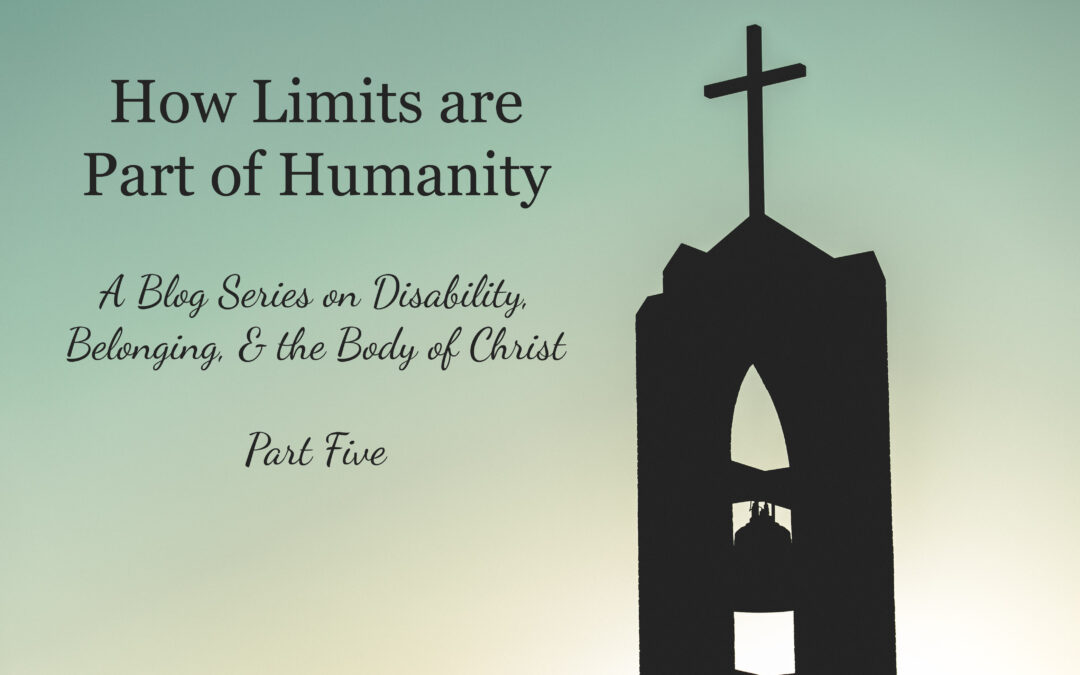“Like everyone else, people with developmental disabilities have wonderful strengths and gifts that exist alongside their limitations.”[1]
Erik Carter
Theologian Deborah Creamer tells us, “…limits are an unsurprising aspect of being human. Limits are normal. Rather than acting as a deficit, they lead us toward creativity, and even toward God.”[2]
If limits are normal, why do limits within the context of disability seem abnormal? Kevin Timpe points out a possible reason: “Although the Church recognizes in its theology that we are dependent on one another and on God, too often it acts as if dependency is a problem to be solved rather than inherent human trait to be affirmed and even celebrated.”[3]
That is a powerful statement. Take a moment to read it again and just sit with it.
At the beginning of the Bible, God told Adam, “It is not good that the man should be alone; I will make him a helper as his partner.” (Genesis 2:18) This speaks of the dependence between two human beings, Adam and Eve.
Going a little further in the Old Testament, we find the story of Moses. He didn’t feel capable of being God’s servant, “…I am slow of speech and slow of tongue.” (Exodus 4:10) God responds in verse 11, “Who gives speech to mortals? Who makes them mute or deaf, seeing or blind? Is it not I, the LORD?” Moses’ brother, Aaron, joined the calling to serve God’s people and help Moses. They worked together, both bringing limits and abilities, and both relying on God to guide actions.
I also want to note three other examples to consider from Scripture:
- Jacob wrestled with God and received a limp that is never healed. His limp did not prevent him from living out his role as father to the 12 tribes. He is named in Jesus’ genealogy in Matthew 1:2.
- Out of all the sons of Jesse, David was chosen as the next king of the Israelites. When he was still young and small, he defeated the giant Goliath without the protection of human armor. While he did not have a disability, per se, he was limited in size and, by human standards, he lacked the ability to fight in a battle. David’s story teaches us a characteristic of God: “…the LORD does not see as mortals see; they look on the outward appearance, but the LORD looks on the heart.” (1 Sam. 16:7b)
- Paul received a physical ailment of some kind. The thorn in his flesh was not removed. God shaped his perspective to see his weakness, or limit, as a strength and sign of Christ’s power in him. God told Paul, “My grace is sufficient for you, for power is made perfect in weakness.” (2 Cor. 12:9)
Physical weaknesses, or limits that occur with a disability, are not supposed to be viewed as abnormal. Limits are not reasons to exclude.
Limits can make a person more creative and determined to identify abilities.
Limits open the space for a healthy dependence on God and each other.
And if we didn’t have limits, how would the world see the power of Jesus shining through us?
Reflect on Your Own
In what ways are you limited? What are your strengths versus weaknesses?
Refer to Scripture
Read the stories of Jacob and Paul: Genesis 32:22-32 and 2 Corinthians 12:7-10.
Respond with Action
Practice dependency. Be aware of when you depend on someone’s help and how you can be available for someone to depend on you. Make sure they know you mean what you say.
[1]Erik W. Carter, Including People with Disabilities in Faith Communities: A Guide for Service Providers, Families, and Congregations (Baltimore: Paul H. Brookes Publishing Co., 2007), 3.
[2]Deborah Beth Creamer, Disability and Christian Theology: Embodied Limits and Constructive Possibilities (New York: Oxford University Press, 2009), 93.
[3]Kevin Timpe, Disability and Inclusive Communities (Grand Rapids: Calvin College Press, 2018), 105.

